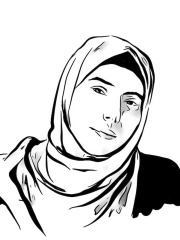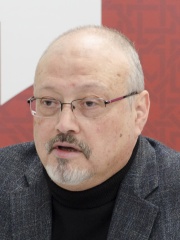
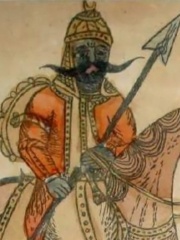
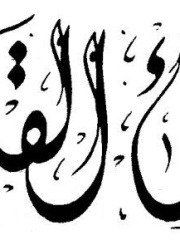

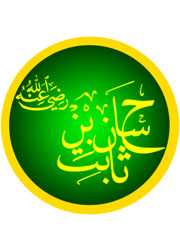



The Most Famous
WRITERS from Saudi Arabia
This page contains a list of the greatest Saudi Arabian Writers. The pantheon dataset contains 7,302 Writers, 15 of which were born in Saudi Arabia. This makes Saudi Arabia the birth place of the 64th most number of Writers behind Lebanon, and Morocco.
Top 10
The following people are considered by Pantheon to be the top 10 most legendary Saudi Arabian Writers of all time. This list of famous Saudi Arabian Writers is sorted by HPI (Historical Popularity Index), a metric that aggregates information on a biography's online popularity. Visit the rankings page to view the entire list of Saudi Arabian Writers.

1. Jamal Khashoggi (1958 - 2018)
With an HPI of 69.21, Jamal Khashoggi is the most famous Saudi Arabian Writer. His biography has been translated into 75 different languages on wikipedia.
Jamal Ahmad Hamza Khashoggi (13 October 1958 – 2 October 2018) was a Saudi journalist, dissident, author, columnist and editor. Khashoggi was assassinated at the Saudi consulate in Istanbul on 2 October 2018 by agents of the Saudi government at the behest of Crown Prince Mohammed bin Salman. Khashoggi was the editor of the Saudi Arabian newspaper Al Watan, which was considered a platform for Saudi progressives. Khashoggi fled Saudi Arabia in September 2017 and went into self-imposed exile. He said that the Saudi government had "banned him from Twitter", and he later wrote newspaper articles critical of the Saudi government. Khashoggi had been critical of the Saudi rulers, King Salman and Crown Prince Mohammed bin Salman. He also opposed the Saudi Arabian-led intervention in Yemen. On 2 October 2018, Khashoggi entered the Saudi consulate in Istanbul to obtain documents related to his planned marriage but was never seen leaving. Amid news reports claiming that he had been killed and dismembered inside, an inspection of the consulate, by Saudi and Turkish officials, took place on 15 October. Initially, the Saudi government denied the death, but following shifting explanations for Khashoggi's death, Saudi Arabia's attorney general eventually stated that the murder was premeditated. By 16 November 2018, the Central Intelligence Agency (CIA) had concluded that Mohammed bin Salman ordered Khashoggi's assassination. The murder created tensions between the U.S. and Saudi Arabia, but did not meaningfully disrupt the friendship between the two countries. On 11 December 2018, Khashoggi was posthumously named Time magazine's Person of the Year along with other journalists who faced political persecution for their work. Time referred to Khashoggi as a "Guardian of the Truth".

2. Antarah ibn Shaddad (525 - 615)
With an HPI of 67.21, Antarah ibn Shaddad is the 2nd most famous Saudi Arabian Writer. His biography has been translated into 32 different languages.
Antarah ibn Shaddad al-Absi (Arabic: عَنْتَرَة بن شَدَّاد الْعَبْسِيّ, romanized: ʿantara ibn šaddād al-ʿabsiyy; 525–608 AD), also known as ʿAntar (عَنْتَر), was a pre-Islamic Arabian poet and knight, famous for both his poetry and his adventurous life. His chief poem forms part of the Mu'allaqāt, the collection of seven "hanging odes" legendarily said to have been suspended in the Kaaba at Mecca. The account of his life forms the basis of a long and extravagant romance.

3. Imru' al-Qais (501 - 544)
With an HPI of 66.04, Imru' al-Qais is the 3rd most famous Saudi Arabian Writer. His biography has been translated into 31 different languages.
Imruʾ al-Qais Junduh bin Hujr al-Kindi (Arabic: ٱمْرُؤ ٱلْقَيْس جُنْدُح ٱبْن حَجْر ٱلْكِنْدِيّ, romanized: Imruʾ al-Qays Junduḥ ibn Ḥujr al-Kindiyy) was a pre-Islamic Arabian poet from Najd in the late fifth and early sixth centuries, and the last King of Kinda. He is sometimes considered the father of Arabic poetry. His qaṣīda, or long poem, "Let us stop and weep" (قفا نبك qifā nabki) is one of the seven Mu'allaqat, poems prized as the best examples of pre-Islamic Arabian verse. His father was said to be Hujr bin al-Harith (حجر ابن الحارث Ḥujr ibn al-Ḥārith), the Kindan regent over the Arab tribes of Asad and Ghatafan, and it is believed that Imru' al-Qais was born in the territory of Asad. His mother was said to be Fatimah bint Rabi'ah al-Taghlibi (فاطمة بنت ربيعة التغلبي / Fāṭimah bint Rabī‘ah al-Taghlibī). Legend has it that Imru' al-Qais was the youngest of his father's sons, and began composing poetry while he was still a child. His father strongly disapproved of this habit in his son, believing poetry to be an unseemly pastime for the son of a king. His father also disapproved of Imru' al-Qais' scandalous lifestyle of drinking and chasing women and eventually banished him from his kingdom, or so the legend goes. But later, when the Asad rebelled and assassinated his father, Imru' al-Qais was the only one of his brothers to take responsibility for avenging his death. Renouncing wine and women, he fought the tribe of Asad until he had exacted revenge in blood, and spent the remainder of his life trying to regain his father's kingdom. Like many figures of early Arabia, which at that time lacked a formal writing system and relied on the oral transmission of stories, the details of the life of Imru' al-Qais are hard to determine with any certainty. Even so, historians have been able to compare the various stories written down by later biographers with clues from Imru' al-Qais' poems and information about major historical events in the Sasanian and Byzantine Empires to reconstruct a probable account of the life and ancestry of this most famous of the Jahili poets. According to one account, his full name and ancestry was Imru' al-Qais, son of Hujr, son of al-Harith, son of 'Amr, son of Hujr the eater of bitter herbs, son of Mu'awiyya, son of Thawr (progenitor of the tribe of Kinda) son of Ufayr (Arabic: ابن عفير إمرؤ القيس ابن حجر ابن الحارث ابن عمرو ابن حجر اكل المرار ابن معاوية ابن ثور الكندي). He was also referred to as "the Lost King" (الملك الضليل al-Malik aḍ-Ḍalīl) because he was never able to recover his father's throne.

4. Ka'b ibn al-Ashraf (600 - 624)
With an HPI of 65.87, Ka'b ibn al-Ashraf is the 4th most famous Saudi Arabian Writer. His biography has been translated into 20 different languages.
Ka'b ibn al-Ashraf (Arabic: كعب بن الأشرف; died c. 624) was, according to Islamic texts, a pre-Islamic Arabic poet and contemporary of Muhammad in Medina. Scholars identify him as a Jewish leader.
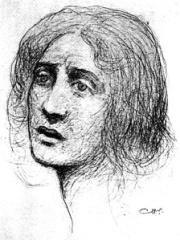
5. Al-Khansa (575 - 645)
With an HPI of 64.95, Al-Khansa is the 5th most famous Saudi Arabian Writer. Her biography has been translated into 32 different languages.
Tumāḍir bint ʿAmr ibn al-Ḥārith ibn al-Sharīd al-Sulamīyah (Arabic: تماضر بنت عمرو بن الحارث بن الشريد السُلمية), usually simply referred to as al-Khansāʾ (Arabic: الخنساء, meaning "snub-nosed", an Arabic epithet for a gazelle as metaphor for beauty) was a 7th-century tribeswoman, living in the Arabian Peninsula. She was one of the most influential poets of the pre-Islamic and early Islamic periods. In her time, the role of a female poet was to write elegies for the dead and perform them for the tribe in public oral competitions. Al-Khansāʾ won respect and fame in these competitions with her elegies, and is widely considered as the finest author of Arabic elegies and one of the greatest and best known female Arab poets of all time. In 629, she went to Medina with a deputation from her clan and, after meeting the Islamic prophet Muhammad, embraced the new religion. Her poetry was later recorded by Muslim scholars, who were studying unaltered Arabic of her time in order to explicate the language of early Islamic texts.

6. Hassan ibn Thabit (554 - 674)
With an HPI of 64.61, Hassan ibn Thabit is the 6th most famous Saudi Arabian Writer. His biography has been translated into 30 different languages.
Hassan ibn Thabit (Arabic: حسان بن ثابت) (born c. 563, Medina died 674) was an Arabian poet and one of the companions of the Islamic prophet Muhammad, who was best known for poems in defense of the prophet. He was born in Medina, and was a member of the Banu Khazraj tribe. Muhammad gave him a slave, Sirin, as a concubine. His writings in defense of Muhammad refer to contemporary events that have been useful in documenting the period. He was also Islam's first religious poet.

7. Al-A'sha (570 - 629)
With an HPI of 60.17, Al-A'sha is the 7th most famous Saudi Arabian Writer. His biography has been translated into 18 different languages.
Al-A'sha (Arabic: ٱلْأَعْشَىٰ) or Maymun Ibn Qays Al-A'sha (d.c. 570– 625) was an Arabic Pre-Islamic poet from Al-Yamama, Arabia. He claimed to receive inspiration from a jinni called Misḥal. Although not a Christian himself, his poems prove familiarity with Christianity. He traveled through Mesopotamia, Syria, Arabia and Ethiopia. He was nicknamed al-A'sha which means "weak-sighted" or "night-blind" after he lost his sight. He continued to travel even after becoming blind, particularly along the western coast of the Arabian peninsula. It was then that he turned to the writing of panegyrics as a means of support. His style, reliant on sound effects and full-bodied foreign words, tends to be artificial. His love poems are devoted to the praise of Huraira, a black female slave. He is said to have believed in the Christian eschatological themes of Resurrection and Last Judgment, and to have been a monotheist. These beliefs may have been due to his interactions with the bishop of Najrān and the 'Ibādites of Al-Hirah. His poems were praised for their descriptions of the wild ass, for the praise of wine, for their skill in praise and satire, and for the varieties of metre employed. Philip F. Kennedy writes of Al-A'sha's love of wine that: It is said that he almost converted to Islam in 629 but fell just short of the act, dissuaded at the last minute upon finding out, already on route to visit Muhammad, about the Islamic proscription of wine. One of his qasidah or odes is sometimes included in the Mu'allaqat, an early collection of Arabic poetry.

8. Ka'b ibn Zuhayr (700 - 662)
With an HPI of 59.64, Ka'b ibn Zuhayr is the 8th most famous Saudi Arabian Writer. His biography has been translated into 21 different languages.
Kaʿb ibn Zuhayr (Arabic: كعب بن زهير) was an Arabian poet of the 7th century, and a contemporary of the Islamic prophet Muhammad. Ka'b ibn Zuhayr was the writer of Bānat Suʿād (Su'ād Has Departed), a qasida in praise of Muhammad. This was the first na'at in Arabic. This is the original Al-Burda. He recited this poem in front of Muhammad after embracing Islam. Muhammad was so moved that he removed his mantle and wrapped it over him. According to traditional accounts, the mantle has been preserved as a relic. This original Burdah is not as famous as the one composed by Imam al-Busiri even though Muhammad had physically wrapped his mantle over Ka'b, not in a dream like in the case of Imam al-Busiri.

9. Umar ibn Abi Rabi'ah (644 - 712)
With an HPI of 57.41, Umar ibn Abi Rabi'ah is the 9th most famous Saudi Arabian Writer. His biography has been translated into 19 different languages.
ʿUmar ibn Abī Rabīʿah al-Makhzūmī (Arabic: عمر بن أبي ربيعة المخزومي) (November 644, Mecca – 712/719, Mecca, full name: Abū ’l-Khaṭṭāb ʿUmar ibn ʿAbd Allāh ibn Abī Rabīʿah Ibn al-Mughayra ibn ʿAbd Allāh ibn ʿUmar ibn Makhzūm ibn Yakaza ibn Murra al-Makhzūmī) was an Arab poet. He was born into a wealthy family of the Quraysh tribe of Mecca, his father being ʿAbd Allāh and his mother Asmā bint Mukharriba. He was characterised by the biographer Ibn Khallikan as 'the best poet ever produced by the tribe of Quraysh'. He is known for his love poetry and for being one of the originators of the literary form ghazel in Islamic literature. He was "impassioned by everything beautiful that he saw in the street or during pilgrimage.". According to Ibn Khallikan, the most prominent object of his affections was al-Thurayya bint Ali Ibn ʿAbd Allāh ibn al-Ḥārith ibn Umayya al-Ashghar ibn ʿAbd Shams ibn ʿAbd Manāf, granddaughter of the famous poet Qutayla bint al-Nadr, who married Suhayl ibn ʿAbd al-Raḥmān Ibn Auf al-Zuhrī, on which occasion Umar recited the following famous verses, which pun on the fact that the married couple’s names are both names of heavenly bodies (Suhayl being Canopus and al-Thurayyā being the Pleiades): O thou who joinest in marriage al-Thurayyā and Suhayl, tell me, I pray thee, how can they ever meet? The former rises in the north-east, and the latter in the south-east!

10. Raif Badawi (b. 1984)
With an HPI of 50.27, Raif Badawi is the 10th most famous Saudi Arabian Writer. His biography has been translated into 38 different languages.
Raif bin Muhammad Badawi (Arabic: رائف بن محمد بدوي, romanized: Rāʼif ibn Muḥammad Badawī, also transcribed Raef bin Mohammed Badawi; born 13 January 1984) is a Saudi writer, dissident and activist, the creator of the website Free Saudi Liberals. Badawi was arrested in 2012 on a charge of "insulting Islam through electronic channels" and brought to court on several charges, including apostasy. In 2013, he was convicted on several charges and sentenced to seven years in prison, and 600 lashes. In 2014 his sentence was increased to 10 years in prison, 1,000 lashes, and a fine of one million Saudi riyals. The flogging was to be carried out over 20 weeks. The first 50 lashes were administered on 9 January 2015. The second flogging was postponed more than twelve times. The reason for the most recent postponement is unknown, but the previous scheduled floggings were delayed due to Badawi's poor health. Badawi is known to have hypertension, and his health worsened after the flogging began. His wife, Ensaf Haidar, who took refuge in Canada after her life was threatened in Saudi Arabia, said that Badawi would not survive further flogging. Ensaf Haidar has given a series of televised interviews about Badawi's plight, including at the 2016 Geneva Summit for Human Rights and Democracy. The Canada-based Raoul Wallenberg Centre for Human Rights acts as Badawi's international legal counsel. The organization has led both public advocacy campaigns as well as private diplomatic efforts to help secure Badawi's release from prison. While his exact location was unknown, it was reported that Badawi was imprisoned in Dhahban Central Prison. On 11 March 2022, his family reported that after 10 years Badawi was released from prison. While he is no longer in prison, his 10 years passport ban continues and he may not leave the country. Al Jazeera quoted an anonymous interior ministry official as saying on 12 March, "the sentence handed down to Raif was 10 years in prison followed by a travel ban for the same length of time. The court ruling holds up and is final. ... He cannot leave the kingdom for another 10 years unless a [royal] pardon is issued."
People
Pantheon has 15 people classified as Saudi Arabian writers born between 501 and 1991. Of these 15, 5 (33.33%) of them are still alive today. The most famous living Saudi Arabian writers include Raif Badawi, Muhammad al-'Arifi, and Rajaa al-Sanea. The most famous deceased Saudi Arabian writers include Jamal Khashoggi, Antarah ibn Shaddad, and Imru' al-Qais. As of April 2024, 3 new Saudi Arabian writers have been added to Pantheon including Muhammad al-'Arifi, Hissa Hilal, and Ashraf Fayadh.
Living Saudi Arabian Writers
Go to all RankingsRaif Badawi
1984 - Present
HPI: 50.27
Muhammad al-'Arifi
1970 - Present
HPI: 47.22
Rajaa al-Sanea
1981 - Present
HPI: 40.48
Hissa Hilal
HPI: 40.05
Ashraf Fayadh
1980 - Present
HPI: 34.90
Deceased Saudi Arabian Writers
Go to all RankingsJamal Khashoggi
1958 - 2018
HPI: 69.21
Antarah ibn Shaddad
525 - 615
HPI: 67.21
Imru' al-Qais
501 - 544
HPI: 66.04
Ka'b ibn al-Ashraf
600 - 624
HPI: 65.87
Al-Khansa
575 - 645
HPI: 64.95
Hassan ibn Thabit
554 - 674
HPI: 64.61
Al-A'sha
570 - 629
HPI: 60.17
Ka'b ibn Zuhayr
700 - 662
HPI: 59.64
Umar ibn Abi Rabi'ah
644 - 712
HPI: 57.41
Hiba Abu Nada
1991 - 2023
HPI: 48.09
Newly Added Saudi Arabian Writers (2025)
Go to all RankingsMuhammad al-'Arifi
1970 - Present
HPI: 47.22
Hissa Hilal
HPI: 40.05
Ashraf Fayadh
1980 - Present
HPI: 34.90





